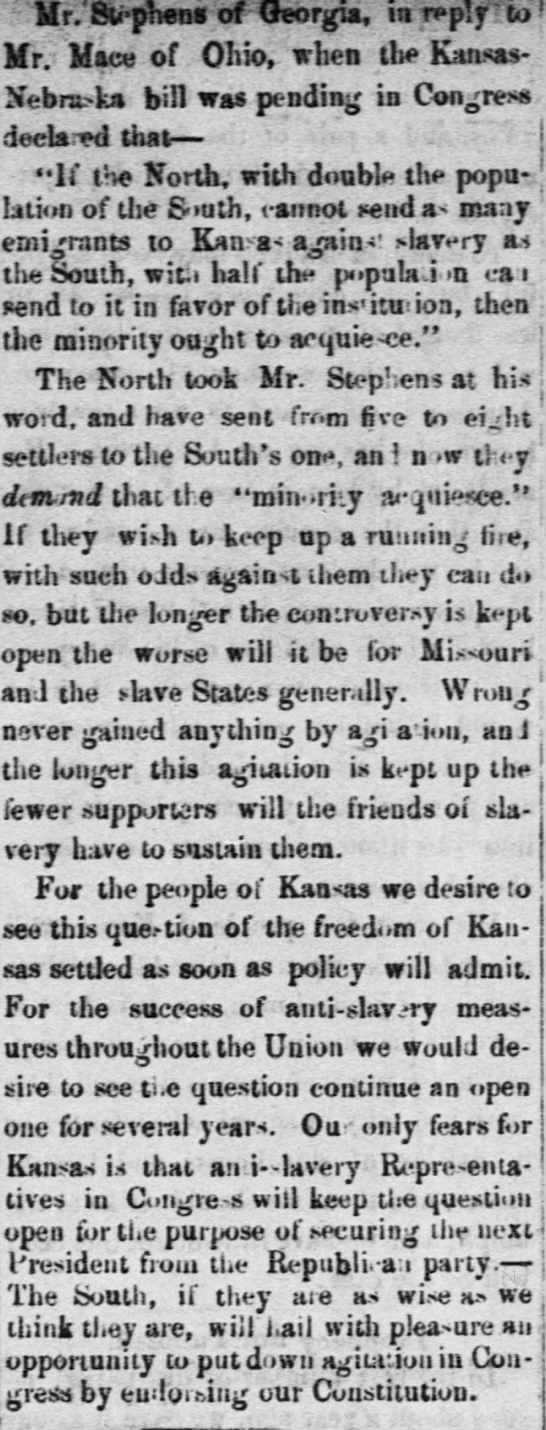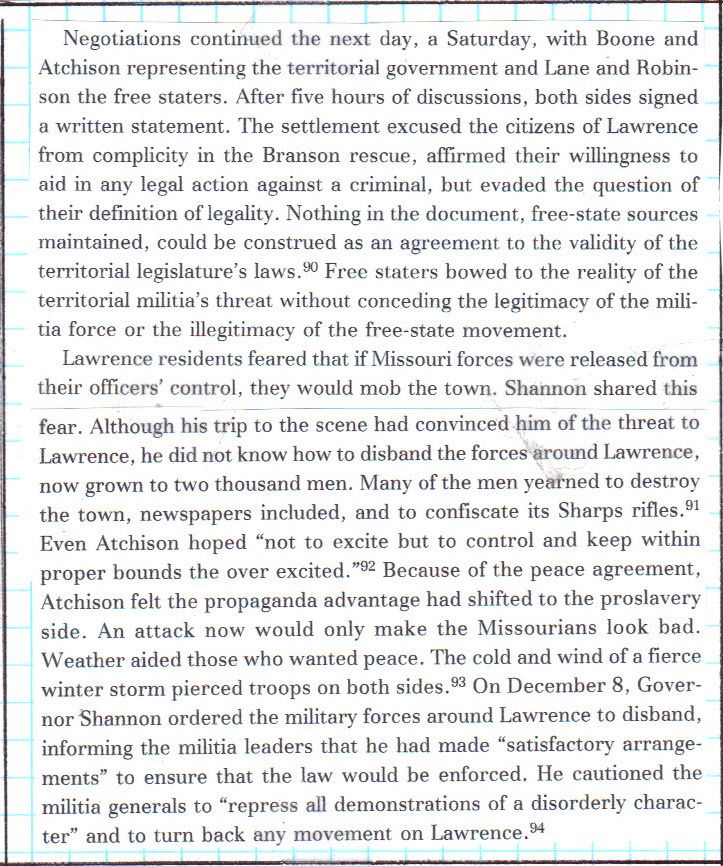
Posted on 11/21/2015 11:35:55 AM PST by Homer_J_Simpson
By "enemies of the Union" the Herald means, of course, insanely radical abolitionist Republicans.
In the Herald's view, they should be given no recognition, sympathy or support whatever.
They are the people, so the Herald believes, who will destroy the Union.
And to this very day, that's just how Democrats continue to speak -- they take their own very worst sins (in this case, the threat of disunion), and accuse Republicans of somehow advocating it.
It's like Obama, Pelosi & Reed accusing Republicans of "shutting down the government", when the decision to do so is 100% their own!
Well put.
I had to look it up, “adjournment sine die” meant they adjourned without scheduling a day for further meetings.

Having grown up in Kansas it's amusing to see opinions expressed that the land is suitable for a slave economy. None of the principle plantation crops that were grown in Missouri have been produced in Kansas in any quantity. Forest cover was only native to uplands in far Eastern Kansas. Maybe those Missourians were smoking their own hemp.
I find it disquieting to see the cause of slavery championed in terms of freedom and liberty.
I’ve been studying the Indiana Constitutional Convention of 1851 as part of the observance of Indiana’s Bicentennial next year. One provision that was included in the 1851 Constitution was Article 13, which read:
Section 1. No negro or mulatto shall come into or settle in the State, after the adoption of this Constitution.
Section 2. All contracts made with any Negro or Mulatto coming into the State, contrary to the provisions of the foregoing section, shall be void; and any person who shall employ such Negro or Mulatto, or otherwise encourage him to remain in the State, shall be fined in any sum not less than ten dollars, nor more than five hundred dollars.
Section 3. All fines which may be collected for a violation of the provisions of this article, or of any law which ay hereafter be passed for the purpose of carrying the same into execution, shall be set apart and appropriated for the colonization of such Negroes and Mulattoes, and their descendants, as may be in the State at the adoption of this Constitution, and may be willing to emigrate.
Section 4. The General Assembly shall pass laws to carry out the provisions of this article.
This was how Indiana chose to deal with the issue of slavery, even though we were a free state. At the time, it was estimated that about 1% of the population was free blacks. The proposed Constitution was put to a popular vote as an up and down measure on the ballot, with the exception of Article 13. It was the only article that received it’s own independent referendum. Article 13 passed by a greater margin than the rest of the Constitution. Some of the counties on the Ohio River bordering Kentucky, a slave state, passed Article 13 unanimously.
I want to introduce someone to the thread that I don’t believe has been mentioned.
Having lived in three border counties on the Kansas Missouri state line for 65 years, I am very much aware of the national and local influence of a Missouri Senator, David Rice Aitchison who spent much of this era in Platte County, Missouri.
Atchison had the vision of a split of the two states in Slavery versus non-slave in the Kansas Nebraska Act and got Douglas to introduce the measure. His pro-slavery vision was so prominent that Atchison, Kansas was chartered as a pro-slavery two named for him. The settlers that came to both areas, were predominantly abolitionist and wanted to go to Kansas and not Nebraska.
The “border ruffians” of Missouri people going over to vote in Kansas to tip the balance back and all the related violence were largely promoted by Aitchison to try to put his vision back on track.
As a young man, he worked for and gained prominence getting the Missouri line pushed all the way to the Missouri river. He felt he had a right to say how the area advanced and was the biggest cause of problems in many local historians accounts of the 1850s.
Kansas Territory went west to the Continental Divide, including the Pikes Peak region. Many thought that was too big a territory for Congress to grant statehood, so the draftsmen gave up the far West, which was later incorporated in Colorado Territory.
There was considerable support for women's suffrage, but that ultimately was deemed too radical. Still, women were granted equal rights to property and children, advanced concepts for the day.
One of the major debates in the Indiana Constitutional Convention regarded property rights for women. At the time of the Convention, women were entitled to one-third of the husband’s estate under the common-law doctrine of “dower.” Delegate Robert Owen sought to increase the amount to two-thirds, abrogating “dower” and expanding it to what is called “taking against the will.” The provision was not included in the Indiana Constitution, but did provide the impetus for the Legislature to pass the same provision statutorily two years later in 1853. The widow’s right to elect to take two-thirds of her husband’s estate “against the will” survives in the Indiana Code to this day.
There was no provision for women’s suffrage in the Indiana Constitution. However, there was a Constitutional provision that allowed resident aliens who had resided in the United States for one year and in Indiana for six months, and had declared an “intent” to become citizens of the United States, the right to vote in state and local elections. Not many people know about that provision.
Son of the utopian socialist of the same name, the founder of New Harmony. The younger Owen served in Congress as a Democrat and was Minister to Naples under Pierce.
That would be him.
It was strange that the merged Herald-Tribune became an important voice in the Republican party since Bennett of the Herald and Greeley of the Tribune were opposite in politics (and in so many other things).
Bennett was very pro-South and violently anti-Lincoln, but had to temper his views once the war started. Bennett was erratic, though, supporting Fremont in 1856 and Breckenridge in 1860. More here and here.
I wonder how many States had similar provisions in the mid-19th Century?
Keep me on the list, Homer.
Non-citizens could vote in some Eastern states in the early years of the country, and in some Western states down until the First World War.
It was called "declarant alien suffrage" because the foreign-born non-citizens had declared their intention to become citizens.
Colorado's original constitution also required that laws be published in Spanish and German for 25 years, but that provision was never enforced.
"Copperhead" was a Civil War term for Northerners who supported the Confederacy.
"Dough-faced" was a pre-Civil War term for Northerners who supported the Southern slave power.
In 1836, Pierce "was attacked by the New Hampshire anti-slavery Herald of Freedom as a 'doughface', which had the dual meaning of 'craven-spirited man' and 'northerner with southern sympathies' "
During the Civil War, Democrat Pierce was highly critical of Republican President Lincoln, and was (mostly) spuriously attacked as a "copperhead".
Whether Pierce was an actual "copperhead" during the war is, seems to me, a matter of debate.
Bottom line: Northern Democrat Dough-faced President Pierce believed then, like all Democrats, that slavery was a pre-condition for Union, and without it, there could be no United States.
He opposed Lincoln's plans to reunite the nation by force.

Nicole Etcheson, "Bleeding Kansas: Contested Liberty in the Civil War Era"
Thanks. Interesting.
 >
> >
> >
> >
> >
>
Ah, I wondered about that.
Disclaimer: Opinions posted on Free Republic are those of the individual posters and do not necessarily represent the opinion of Free Republic or its management. All materials posted herein are protected by copyright law and the exemption for fair use of copyrighted works.